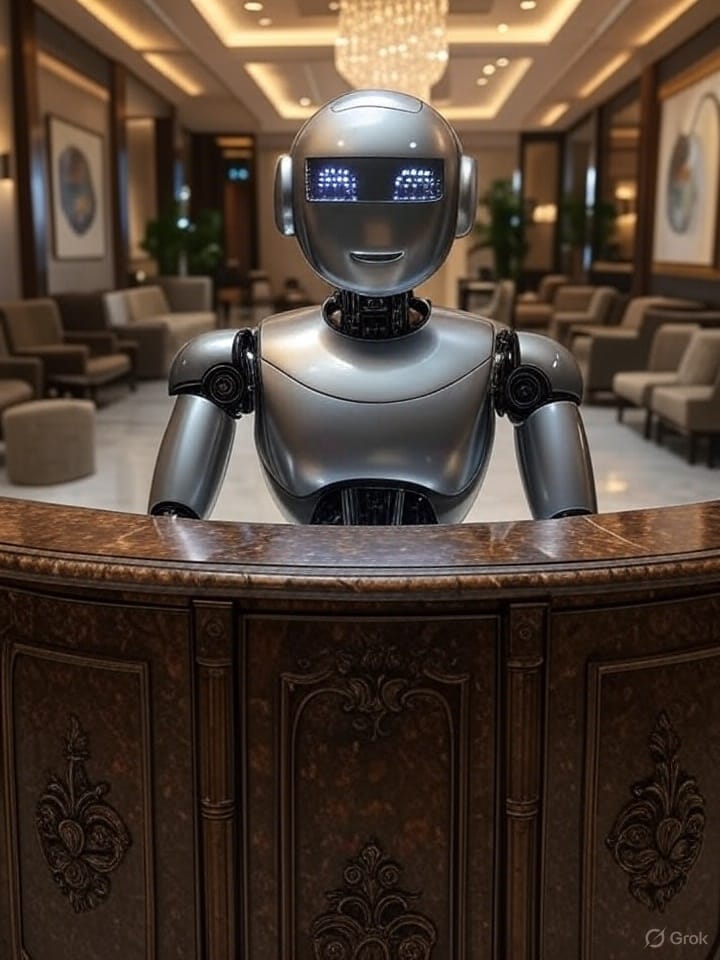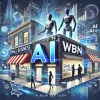
By Elke Porter | WBN News Global | July 1, 2025
Subscription to WBN and being a Writer is FREE!
The hospitality and tourism industries are being reshaped by artificial intelligence (AI) and robotics, transforming guest experiences and operational efficiency. From humanoid robots greeting guests at Japan’s Henn-na Hotel to AI-driven booking platforms like IHG’s mobile app, these technologies are enhancing personalization and streamlining services.
However, the rise of AI also sparks concerns about job displacement and restructuring, necessitating a balance between innovation and human connection.Hotels globally are adopting AI to elevate service while optimizing operations.
At Henn-na Hotel, multilingual humanoid and dinosaur robots handle check-in and offer instant recommendations for local attractions, dining, and amenities in guests’ preferred languages (https://www.hennnahotel.com/en/). Similarly, Aloft Hotels use Botlr to deliver items like towels and snacks, reducing wait times (https://www.marriott.com/en-us/hotels/aloft-hotels). These robots operate 24/7, providing seamless assistance beyond human shift constraints.
In travel booking, AI is revolutionizing trip planning. IHG’s generative AI tool analyzes guest preferences and market data to create personalized itineraries and suggest optimal booking times (https://www.ihg.com/content/us/en/customer-care/mobile-app). Platforms like Atomize employ AI-driven dynamic pricing to adjust hotel rates in real-time, maximizing revenue (https://www.atomize.com/).
These systems handle multiple inquiries simultaneously, resolving issues like flight changes or refunds with unmatched efficiency.Smart room technology marks another advancement. At EMC2, part of Marriott’s Autograph Collection, guests use Amazon Alexa to control lighting, temperature, and entertainment via voice commands (https://www.emc2hotel.com/). EMC2’s robots, Cleo and Leo, deliver room service, minimizing human contact when preferred, enhancing convenience, and reducing staff workload for routine tasks.
In tourism, AI delivers hyper-personalized experiences through predictive analytics. Marriott’s RENAI assistant curates tailored itineraries based on guest preferences, past behaviors, and real-time data, suggesting activities like museum visits or dining options (https://www.marriott.com/en-us/hotels/chimc-renaissance-chicago-downtown-hotel/overview/). Radisson Hotel Group uses AI for immersive event planning, enabling clients to visualize setups before booking (https://www.radissonhotels.com/en-us/corporate/meetings-events). These tools achieve customization at a scale previously unattainable.
Yet, AI’s rise poses challenges, particularly job displacement. Routine roles like front desk staff, concierges, and room service attendants face automation risks. Studies estimate 20-25% of hospitality jobs, especially repetitive tasks, could be automated by 2030, impacting seasonal or low-skill workers, particularly in high-unemployment regions (https://www.hospitalitynet.org/news/4109187.html). For example, robots like BellaBot, used in hotels and restaurants, can replace tasks traditionally performed by waitstaff or porters (https://www.pudurobotics.com/products/bellabot). This shift requires workers to upskill in areas like emotional intelligence or technology management.
Job restructuring is evident. AI tools like Boom’s AiPMS streamline property management, freeing staff to focus on complex guest needs, such as resolving unique complaints or creating memorable experiences (https://www.abodeworldwide.com/post/ai-in-the-hospitality-industry). While this enhances human interaction, reskilling efforts often lag behind rapid technological adoption, leaving some workers vulnerable. Hotels are investing in training for roles like guest experience managers, but the transition remains challenging.
Despite these concerns, AI complements rather than eliminates human interaction. By automating repetitive tasks, staff can prioritize emotional connections, like personalized greetings or handling special requests, which robots cannot replicate. At high-end properties like Ritz-Carlton, staff focus on bespoke experiences while robots like BellaBot handle deliveries, blending AI efficiency with human warmth.
Looking ahead, AI promises smarter solutions, with predictive models anticipating guest needs—such as pre-ordering favorite meals based on past stays. However, ethical concerns, including job displacement and the “uncanny valley” effect of human-like robots, must be addressed to ensure responsible integration.
The rise of AI is also creating new and evolving job opportunities in hospitality, many of which didn’t exist a year ago. Roles like AI system trainers are emerging to teach chatbots and robots to handle guest interactions, requiring skills in natural language processing and data annotation.
Guest experience analysts use AI-driven insights to design personalized services, blending data science with hospitality expertise. Robotics maintenance technicians ensure robots like Botlr or BellaBot operate smoothly, demanding technical skills in robotics and AI hardware. Smart hotel technology coordinators oversee the integration of voice-activated systems and IoT devices, a role combining IT and guest service knowledge.
Additionally, sustainability data specialists leverage AI to optimize energy use in smart hotels, aligning with eco-conscious trends. These roles, fueled by AI’s rapid adoption, offer career paths for tech-savvy workers, with hotels like Marriott and Hilton investing in such positions to enhance operations (https://www.hospitalitynet.org/news/4123456.html). As smart hotels expand, these innovative jobs redefine the industry’s workforce.
TAGS: #AI in Hospitality #Robots in Hotels #Travel Tech #Smart Hotels #Hospitality Innovation #AI Personalization #WBN News Global #WBN Ai Edition #Elke Porter
Connect with Elke at Westcoast German Media or on LinkedIn: Elke Porter or contact her on WhatsApp: +1 604 828 8788. Public Relations. Communications. Education.



